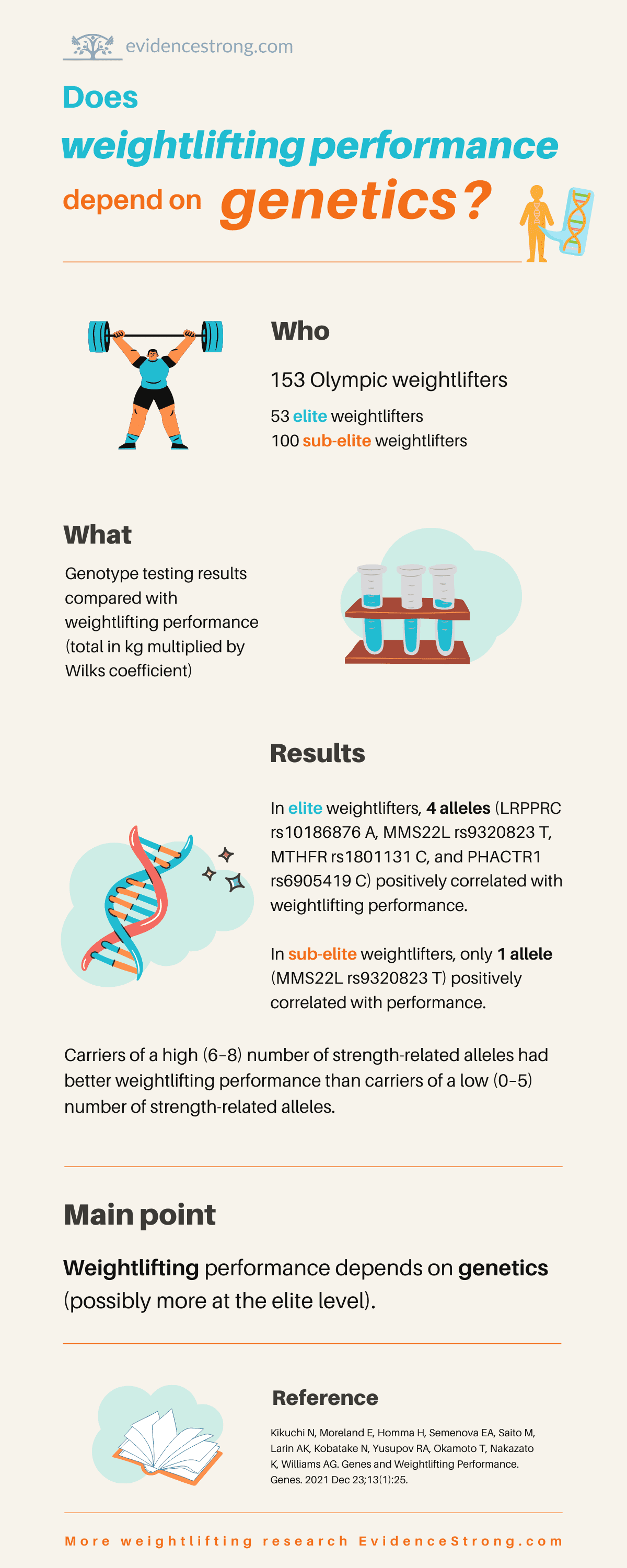Summary of study comparing specific genotype in elite and sub-elite Olympic weightlifters with their weightlifting performance.
Who
153 Olympic weightlifters:
- 53 elite weightlifters (22 females, 31 males; aged 23.3±4.1 years; Russian) and
- 100 sub-elite weightlifters (47 females, 53 males; aged 21.4±4.2 years; Japanese).
Design
Genotype testing
Outcome measures
- snatch and clean & jerk performance (total in kg multiplied by Wilks coefficient)
- polygenetic score (based on 28 DNA polymorphisms)
Main results
Elite weightlifters:
- polygenetic score positively correlated with weightlifting performance.
- carriers of the high number of strength-related alleles (27-34) had better weightlifting results than carriers of the low number of strength-related allels (20-26).
- specific alleles that correlated with performance are: LRPPRC rs10186876 A, MMS22L rs9320823 T, MTHFR rs1801131 C, and PHACTR1 rs6905419 C.
- carriers of a high (6-8) number of strength-related alleles had better weightlifting results than carriers of a low (0-5) number of strength-related alleles.
Sub-elite weightlifters:
- specific alleles that correlated with performance: only MMS22L rs9320823 T.
- carriers of a high number of strength-related alleles were stronger than carriers of a low number of strength-related alleles.
Take home message
For a clinician & coach
Weightlifting performance depends on genetics, especially in elite weightlifters. Weightlifters with high number of strength-related alleles in their genotype produce higher weightlifting results. LRPPRC rs10186876A, MMS22L rs9320823 T, MTHFR rs1801131 C, and PHACTR1 rs6905419 C were associated with greater weightlifting performance in elite weightlifters, and MMS22L rs9320823 T allele in sub-elite weightlifters.
For a parent
Weightlifting performance depends on genetics. Better weightlifters had a higher number of gene types related to strength.
For an athlete
Weightlifting performance depends on genetics. Specific genetics may stimulate better weightlifting results.
Original article
Kikuchi N, Moreland E, Homma H, Semenova EA, Saito M, Larin AK, Kobatake N, Yusupov RA, Okamoto T, Nakazato K, Williams AG. Genes and Weightlifting Performance. Genes. 2021 Dec 23;13(1):25.
You might want to read next
Tokyo 2020 weightlifting medalists’ characteristics
How old are the best athletes in weightlifting and powerlifting?
